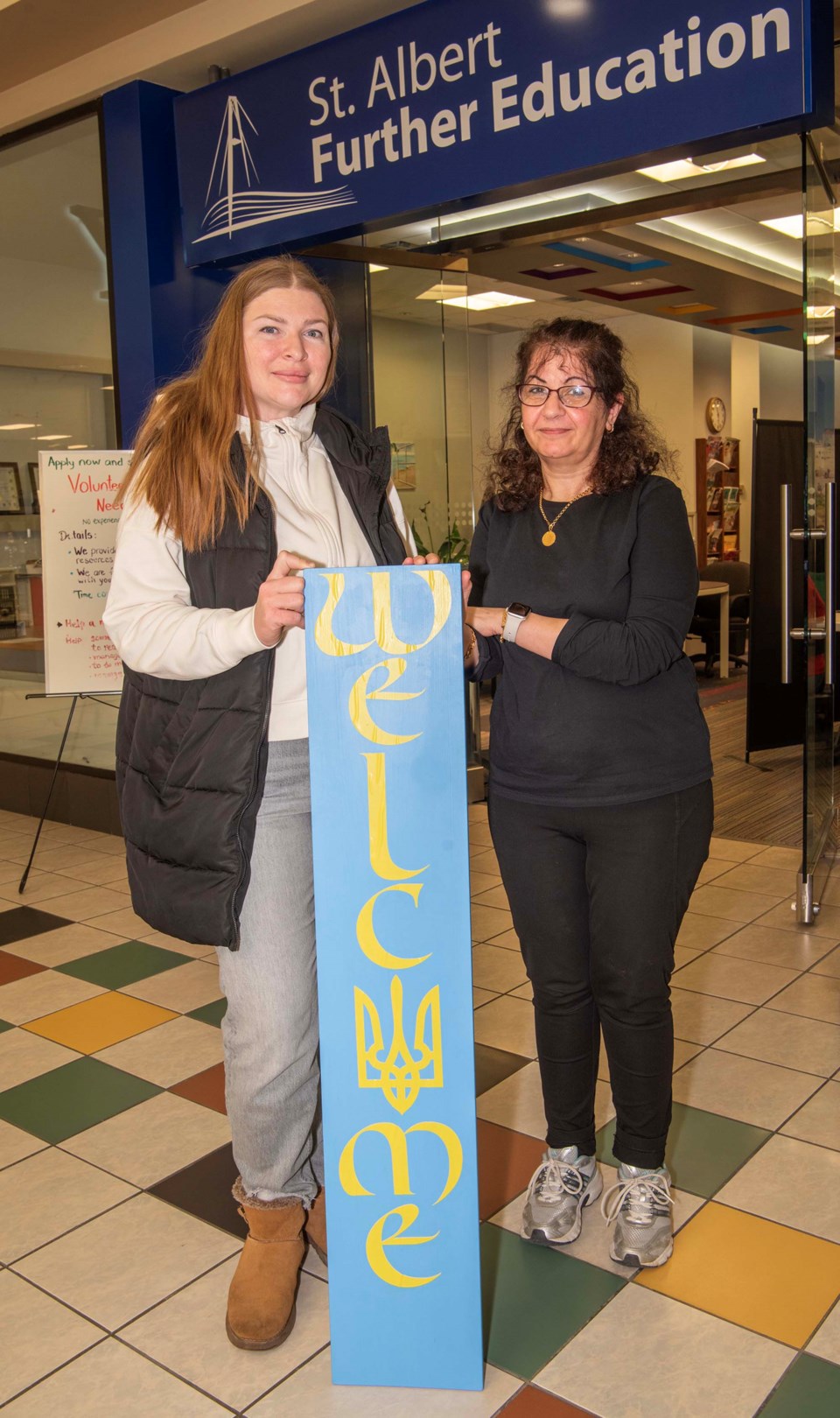For some, last month marked the third anniversary of the start of Russia’s invasion of Ukraine.
For St. Albert resident Tyna Hlushchevska, it was closer to the 11th. She and her family were living in Ukraine’s Crimea region when Russian soldiers invaded it in 2014, prompting them and many others to flee.
“When the [war] started in 2022 again, it was stressful for our family because our second child had just been born,” she said.
Her sister in Canada urged her to come here for her own safety. Hlushchevska, her husband, and their two children arrived in St. Albert that May. Now, they have jobs and a house here, and no plans to leave any time soon.
“We want to stay here. We don’t want to move any country more.”
Settling in
Hlushchevska was one of some roughly 300,000 Ukrainians who have come to Canada since February 2022 through the Canada-Ukrainian Authorization for Emergency Travel (CUAET) program, which ran from March 2022 to April 2024. Based on data from St. Albert Further Education, about 508 Ukrainians came to and may still be in St. Albert from 2022 to 2024. (The data does not account for those who did not register with Further Education or have since left St. Albert.)
Polina Vatral was one of the last CUAET newcomers to come to St. Albert, having immigrated here in March 2024. She was visiting friends in Budapest, Hungary, when the 2022 invasion began and lived there with her daughter and mother for two years.
“I didn’t speak Hungarian at all,” she said, but she did speak English, and she had heard of Canada’s CUAET program.
Vatral said Cheryl Dumont of St. Albert Further Education helped her find a host family, English lessons and a job. She now works at Goodwill and Save-On-Foods in St. Albert while her daughter attends W.D. Cuts. She has made friends with other Ukrainian families, and is learning Spanish through the St. Albert Public Library.
“I really appreciate your support,” she said to the people of St. Albert.
Hlushchevska said it was hard for her at first to accept the many offers of help she got in St. Albert. She was also surprised by how strangers on the street would just smile and wave at you — acts that would be seen as suspicious back home.
“They say ‘Hi,’ they’re smiling, they pet your baby, they’re talking to you.”
Vatral said the quality of life in Canada is much better than it was in Ukraine, especially for seniors.
“In Ukraine, when you’re an old person, you probably don’t have enough money even for food sometimes.”
Future challenges
Most Ukrainian newcomers are doing fairly well in the St. Albert region, with some now seeking permanent resident status, said Cherilyn Michaels, a St. Albert resident who has helped hundreds of those newcomers find host families as founder of Edmonton Hosts Ukrainians.
“The biggest long-term problem for them is getting permanent residency,” Michaels said.
“Most of the Ukrainians who came here, they have no place to go back to.”
One near-term problem for newcomers was the three-year work permits they received upon arrival in Canada through CUAET, Michaels said. Those permits will start expiring this April. You need a valid Ukrainian passport to get those permits renewed, and the wait to get your passport renewed can be as long as six months. Some newcomers are flying to Europe just to avoid the wait.
Tens of thousands of Ukrainians could lose access to work, school, and health care this year if these permits are not renewed on time, Michaels said.
“It’s a huge train wreck waiting to happen.”
On Feb. 27, Immigration, Refugees and Citizenship Canada announced that any Ukrainians who arrived in Canada through CUAET on or before March 31, 2024, will now have until March 31, 2026, to apply for or renew their three-year work or study permits.
Micheals said this change will help, but not as much as an automatic renewal.
Hlushchevska and Vatral said they have no plans to return to Ukraine unless it’s for a visit. Both planned to pursue permanent resident status.
“Even if [the war] is over, I would like to stay here,” Vatral said.
“I want my daughter to, when she’s 60 or 70, to live life here.”



